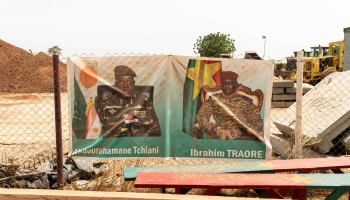Tunisia’s government has turned arbitrary detention into a key weapon in its crackdown on dissent, using abusive prosecutions and sweeping arrests to strip citizens of their civil and political rights, Human Rights Watch (HRW) said in a report released Wednesday.
The 42-page report, “‘All Conspirators’: How Tunisia Uses Arbitrary Detention to Crush Dissent,” accuses President Kais Saied’s government of expanding repression through politically motivated charges and detentions aimed at silencing critics.
“Not since the 2011 revolution have Tunisian authorities unleashed such repression,” said Bassam Khawaja, deputy Middle East and North Africa director at Human Rights Watch.
He claimed that President Saied’s government has returned the country to an era of political prisoners, “robbing Tunisians of hard-won civil liberties.”
Since Saied seized emergency powers and dissolved key institutions in July 2021, authorities have dramatically escalated their pursuit of perceived opponents. HRW documented the cases of 22 people held on questionable charges, including terrorism, in connection with peaceful expression or political activity. At least 14 face charges that carry the death penalty.
Those detained range from lawyers, journalists and social media users to political figures and a human rights defender. As of January 2025, more than 50 people were being held on political grounds or for exercising basic rights, the report said.
Among them are high-profile opposition leaders such as Abir Moussi, president of the Free Destourian Party, and Rached Ghannouchi, former president of the Ennahda party and former speaker of the parliament. Others jailed for publicly criticizing the government include lawyer Sonia Dahmani and journalist Mohamed Boughalleb.
HRW said Saied has fueled the crackdown by publicly labeling critics and political adversaries as “traitors” and “terrorists.”
The report accuses authorities of leaning on an “aggressive legal toolbox” to justify politically motivated charges. That includes Tunisia’s penal code and the 2015 Counterterrorism Law, which permits up to 15 days of detention, anonymous witnesses, and broad surveillance powers.
According to HRW, the authorities have also been using the controversial Decree-Law 54—adopted in 2022, which criminalizes the use of digital platforms to spread so-called “false news” or content deemed harmful to public order or state security—as well as parts of the Telecommunications Code, to prosecute online expression. Many detainees have been charged with “attempting to change the nature of the state,” a vague offense that can carry the death penalty.
HRW said the government’s attacks on judicial independence—including Saied’s dismantling of the High Judicial Council, which was tasked with ensuring the proper functioning of the judicial system—have severely undermined fair trial guarantees.
“They have also targeted defense lawyers with judicial harassment, criminal prosecution, and travel bans for the legitimate exercise of their profession. Tunisian authorities have prosecuted, convicted, and detained civilians deemed critical of the authorities in military courts, which should not have jurisdiction over civilians,” according to HRW.
Many detainees are reportedly held in harsh conditions, including prolonged surveillance, continuous artificial light, inadequate medical care, and invasive searches.
Among them is journalist Chadha Hadj Mbarek, who has a hearing disability and is serving five years for “attempting to change the nature of the state.”
Her brother Armen told HRW that she has difficulty hearing her family during visits due to the physical setup and has no communication support and that the prison authorities have also denied her access to her medication.
HRW stressed that Tunisia is a party to international treaties that guarantee freedom of expression, the right to protest, and protection from arbitrary detention—including the International Covenant on Civil and Political Rights and the African Charter on Human and Peoples’ Rights.
The organization called on authorities to release those arbitrarily detained and drop abusive charges. It also urged Tunisia’s international partners, particularly the European Union, to pressure the government to halt its crackdown.
“Tunisia’s international partners have consistently ignored the deteriorating human rights situation in Tunisia, even as political opponents and critics rack up one heavy-handed prison sentence after another,” Khawaja said.
“The international community has an urgent responsibility to do its utmost to seek the release of all those unjustly detained,” he concluded.
The report echoes the concerns Amnesty International raised in a letter to President Kais Saied last week, urging him to ensure the immediate release of seven opposition figures in particular, as they were “detained solely for the peaceful exercise of their human rights,” and that “all the unfounded charges against all defendants in the case are immediately dropped, and arbitrary travel bans and restrictions on their rights are lifted.”






